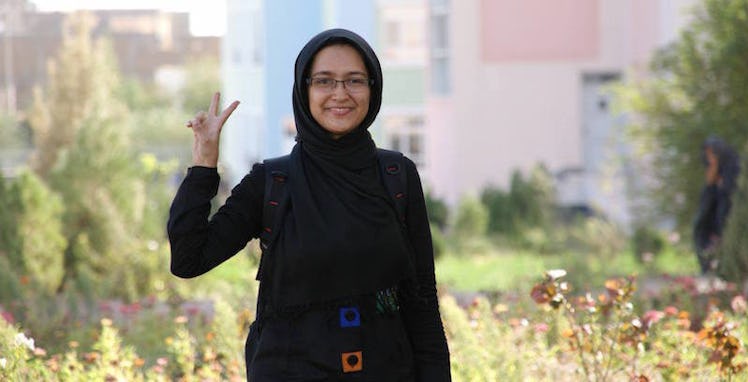
Bitcoins and Beyond: Creating A Financial Future For Afghanistan Women
Much of the world limits women’s participation in the workforce, in education and in social life.
Under the Taliban, for example, women in Afghanistan were not even allowed to leave the house without a male companion. What happens when you lock 50 percent of a society away at home?
I was born in Iran. My family moved to Afghanistan when the Taliban was ousted. I vividly remember the ride from the Iranian border to Herat City. The car bounced along unpaved roads for five hours.
We were let off in near-total darkness, only the odd lamp to tell us the power was on. It would soon shut down for the night, and not much difference would be seen. Drinking water was pumped from a well and stored in barrels, jerry-cans and anything else watertight.
A decade later, the ride takes two hours by highway. Arrival is marked by colorful signs that light up the rows of shops. Water comes from a faucet and people can reach the outside world through their mobile phones. Not night and day, but close.
Take a closer look and you’ll find more progress, but it’s uneven. According to the Afghan Ministry of Education, school enrollment has risen from 900,000 pupils in 2001 to 10.5 million in 2013.
Girls’ access to education has increased as well, with girls growing from a small minority to 42 percent (4.4 million) of the country’s student population. While this is an encouraging development, keep in mind almost 40 percent of Afghanistan’s inhabitants are under the age of 14.
Optimistically, they’re only halfway there, and still, the girls and women face the threat of violence (including in and on their way to school), forced and underage marriage, and all the other struggles of living in a tribal society finally being exposed to the outside world. Women still stick out in the workplace, in schools and on the streets.
In short, gender inequality is far from over.
To change an embedded social system, one must offer alternatives. I work to do that through Code to Inspire, an organization I founded to equip women in Afghanistan with technical literacy and coding skills that make them employable in the age of the Internet.
I’ve seen firsthand that Internet access has allowed Afghan women to communicate and organize outside of the traditional structures that repress them. For the first time in their lives, these women are able to meet new people and compare experiences.
Perspective is the first step to realizing change. In this regard, no single invention has done more to empower women than the Internet. And I believe the Internet’s impact will only increase with the maturation and spread of cryptocurrency, a form of digital currency that operates outside of central banks.
What social media did for communication, cryptocurrency promises to do for women’s autonomy. In places where it is taboo for women to even step out the door unattended, I’ve seen that Bitcoin allows them to more fully participate in the world.
In a society that lacks banks, blockchain technology like Bitcoin offers a secure, transparent way to store value. It reduces operation costs and counters money laundering. But, most importantly, it affords those marginalized by the brick-and-mortar finance system a chance to participate in the economy on their own terms.
The objective here is financial inclusion, which is not just having a bank account.
For an economy to be inclusive, women need equal access to opportunity – a major topic of discussion this week among the more than 1,000 world leaders who convened for the Clinton Global Initiative (CGI) 2015 Annual Meeting in New York City.
I was thrilled to join visionaries, such as Neil de Grasse Tyson, Sangeeta Bhatia and Richard Branson, in discussing the contemporary innovations that can bring benefits to underserved communities.
I believe Bitcoin is one of these innovations – but it’s not the only one, as demonstrated by the commitments made by CGI participants.
It was exciting to hear about the progress made by Women Deliver, who fulfilled a commitment they made through CGI to launch Catapult, a web-based crowdfunding platform designed to drive donations from people to projects that advance the lives of girls and women around the world.
Women will benefit from a commitment announced today by Channel IT, which, by 2018, will provide sustainable micro-loans to millions of Africans through direct financing and peer-to-peer funding made possible by mobile and cloud technology.
Whether through cryptocurrency or other innovations, there are more opportunities to empower women than ever before. Though the early adopters of cryptocurrency still face hurdles, progress will unlock doors. And through these doors walk brave young women who know the dangers of taking the next step – whether it’s acid attacks or the destruction of their schools – but are determined to find ways to pursue an education.
The entire other half of Afghanistan’s economic potential is just starting to reveal itself.
Money talks, and as Afghan women are empowered through the global economy, they increasingly find themselves coming to the table with a new level of independence.
With increased financial reach, women in Afghanistan can bypass the prejudiced system in place and work to provide for themselves and their families in fulfilling ways that would have been unthinkable under the Taliban.
One of the biggest takeaways from the CGI Annual Meeting is we must be steadfast in investing in and expanding access to innovations that can lift up the billions of people living in the margins.
Persistence is key because ending gender inequality in Afghanistan or anywhere else in the world won’t be easy.
There is no switch that can be flipped to make financial exclusion disappear. But in front of us is an opportunity to work together on solutions that financially empower girls and women and strengthen the future for us all.